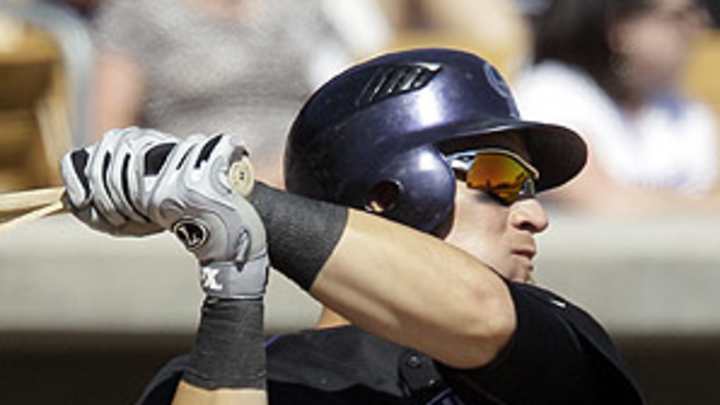Ripple effect in wake of Mike Jacobs' failed test for HGH


Can a decision by the U.S. Supreme Court in 1922 help to explain why Mike Jacobs, who until his release this morning was playing for the Colorado Rockies' Triple-A affiliate, just became the first player in pro baseball, basketball, hockey or football to test positive for Human Growth Hormone (HGH)?
The answer is yes, and it sheds light on the unusual legal protections afforded to Major League Baseball, particularly in its overseeing of minor league baseball.
In 2010, Major League Baseball announced that minor league players would be randomly tested for HGH, a substance which is illegal without a doctor's prescription and which has been associated with helping athletes recover faster from injury and also -- with much less certainty -- helping their performance. HGH is also known to be very difficult to detect; only a blood sample, usually taken within 36 to 48 hours of HGH being introduced into the blood stream, can reliably show its presence. Jacobs, 30, admits he took HGH to recover from back and knee injuries and may have miscalculated the timing of when he would be tested.
Although Olympic athletes have been subject to HGH testing since 2004, no U.S. pro league had required HGH testing until MLB did of minor league players (as part of its new collective bargaining agreement, the NFL now tests for HGH). Players' unions had raised privacy concerns about the drawing and sampling of blood. But because most minor league players are not members of the Major League Baseball Players' Association, the MLBPA could not object to the minor league HGH testing policy, the manner in which testing would occur -- such as frequency of testing, methods of drawing blood and determination of how much HGH in the body should trigger punishment -- or the assigned punishments, which are 50 games for a first offense, 100 games for a second offense and possible permanent suspension for a third offense. Nor could minor league players collectively object to the policy, since they are not unionized.
Minor league players are disadvantaged in negotiating their working conditions in part because of the Supreme Court's 1922 decision in Federal Baseball Club v. National League. In that case, the Supreme Court held that federal antitrust law does not apply to Major League Baseball. The Court's reasoning, which would seem unpersuasive nowadays, deemed baseball to be a purely intrastate affair (federal law only applies to interstate activities -- given that MLB teams travel across the country and sell merchandise and broadcast games nationally, it is safe to say that baseball is now an interstate activity). The decision meant that antitrust law could not regulate baseball or how its competing teams collaborate to set prices, wage levels and working conditions.
Other Supreme Court decisions, including, most famously, Curt Flood's losing case in 1972, reaffirmed the antitrust exemption, which the NBA, NFL and NHL do not enjoy. The exemption was narrowed in 1998, when President Clinton signed the Curt Flood Act, which, generally speaking, eliminated baseball's antitrust exemption for matters related to the employment of Major League Baseball players. Importantly, however, the Curt Flood Act did not apply to minor league baseball, meaning minor league baseball operations remain exempt from federal antitrust law and thus minor league players cannot raise antitrust challenges.
Even though Jacobs is a former big leaguer -- he spent six seasons with the Mets, Royals and Marlins from 2005-2010 -- he is still subject to the working conditions of minor league baseball while playing in the minors. As a result, neither he nor any minor league player who tests positive for HGH can obtain assistance from the MLBPA; compare how minor league players lack a collective group advocating their interests to the MLBPA fighting on behalf of Cubs pitcher Carlos Zambrano, who was just disqualified, without pay, for 30 days for leaving the stadium early.
Although Jacobs admits to using HGH and does not challenge the testing, the dire consequences to his career could rekindle calls for minor league players to form a union, which could negotiate working conditions with MLB organizations and represent minor league players in disputes with teams. Unionization of minor league baseball remains unlikely, however, as some minor league players have expressed concern that unionization could lead to push back by baseball and ultimately worse working conditions.
With Major League Baseball's collective bargaining agreement set to expire on December 11, 2011, expect owners to push for the adoption of HGH testing of big league players. Owners can cite the testing of minor league players and also the willingness of NFL players to undergo HGH testing. Then again, the MLBPA has traditionally been the strongest players' union and has been categorically opposed to HGH testing for some time. While the adoption of HGH testing is unlikely to be a "deal breaker" for reaching a new CBA, today's news about a relatively obscure player hints at how the issue could play a major role in the forthcoming discussions.
Michael McCann is a sports law professor and Sports Law Institute director at Vermont Law School and the distinguished visiting Hall of Fame Professor of Law at Mississippi College School of Law. He also teaches a sports law and analytics reading group at Yale Law School. Follow him on Twitter.
